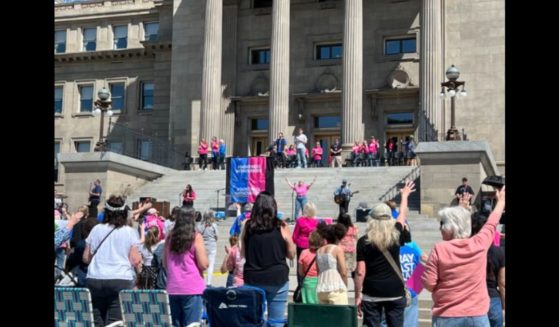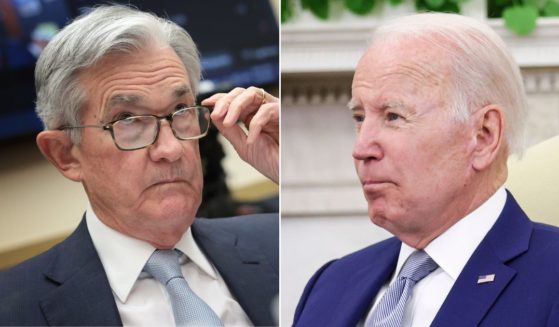Chicago Mayor Bragged About City's New COVID Center, But It Cost Taxpayers $1.7 Mil Per Patient
Our younger readers might not be old enough to remember the most insufferable bumper sticker ever created: “It will be a great day when our schools have all the money they need, and our air force has to have a bake-sale to buy a bomber.”
I came in on the late end of the era of this epigram by author Robert Fulghum — being one of those millennials who still remembers dial-up modems. My middle-school language arts teacher, a dedicated Jimmy Buffett fan, had one plastered on the painted-cinderblock wall. The stickers’ habitat, however, was on the bumper of forest-green Subarus from sea to shining sea.
I was reminded of that sticker when I saw two divergent stories out of Chicago, one from this week and the other I remembered from last autumn. The Windy City apparently has all the money it needed to treat COVID-19 victims that didn’t really materialize at a cost of $1.7 million per patient, but police had to hold a pancake breakfast to buy their own bulletproof vests. It’s not schools and the Air Force, I suppose, but it’s an ironic twist on Fulghum’s maxim.
A bit of an explainer: Officials in Chicago, like many major cities, believed when the coronavirus hit that they were going to be overwhelmed, with hospitals overflowing and critically ill patients being refused treatment. Thus, they built what Chicago Mayor Lori Lightfoot called an “alternate care facility” in the McCormick Place convention center.
When it was completed in April, WMAQ-TV quoted Lightfoot as saying it was an “astronomical feat” upon touring it. The plan was that up to 3,000 patients with mild symptoms could be treated at the site, relieving the burden on the city’s hospitals. The transformation was mostly courtesy of the Army Corps of Engineers and a firm called Walsh Construction, whom we’ll hear about later.
At the time, the mayor touted this as if it were a signature project.
“This is the product of all of us working together,” Lightfoot had said of the project the week before the tour. “The size, the speed, and the scope is unlike anything else in the country.”
The mayor was equally impressed during the tour of the hospital — which, according to the Chicago Sun-Times, would end up costing $65.9 million.
“I want to stress just how remarkable it was to pull this all together in a short amount of time,” she said. “Studies will be made about just how fast this project came together.”
Studies would indeed be made, and they’d be made as soon as August. The coronavirus and all its attendant problems are still very much with us. The McCormick Place hospital is not; on May 1, only 21 days after Lightfoot toured that “astronomical feat,” WTTW-TV reported it was shutting down.
“Today, we are pleased to report that the curve is flattening, and our local hospitals and health care systems continue to operate with capacity,” Lightfoot, who is a lightning rod for critics, said in a joint statement with Illinois Gov. J.B. Pritzker (a fellow Democratic lightning rod).
“An abundance of caution” caused officials to spend the money for the hospital, officials said at the time. That continues to the line, with aides telling the Chicago Sun-Times the hospital was an “insurance policy” during an “immense emergency.”
“It’s something I’m incredibly proud of,” said Samir Mayekar, the deputy mayor for economic and neighborhood development, in a piece published in the Sun-Times on Friday.
Chicago functionaries probably shouldn’t focus on how quickly they were able to turn McCormick Place into a makeshift hospital for two reasons. First, the miscalculation in terms of how much hospital capacity was needed was way off. For instance, out of the potential 3,000-bed capacity — which was never reached anyway — McCormick Place saw 38 patients. There aren’t zeroes missing there or other digits I forgot.
At a cost of $66 million for the work, that breaks down to $1.7 million per patient.
It would be unfair to say Lightfoot’s Chicago was alone in constructing field hospitals that ended up being money pits for cities who could ill afford to burn cash. The federal government is covering at least 75 percent of the costs, at the very least. Beyond the money and the miscalculation, however, is how the bidding worked.
Chicago, like many locales, believed the bidding had to be wrapped up quickly. Processes that usually take months were squeezed into days.
The bids were handled by a body known as McPier, an entity run cooperatively by the city and the state abd owns both McCormick Place and the nearby Navy Pier. Out of three bids from construction companies, McPier chose Walsh Construction within hours.
According to the Sun-Times, however, internal emails from an Army Corps of Engineers official stated that both of the other bids on the project were better than Walsh’s, and one of the other companies had even agreed to waive fees because it didn’t want to profit from COVID-19.
However, as the Sun-Times notes, Walsh Construction is “a politically connected Chicago company that’s built everything from highways to high-rises.”
At least, according to Mayekir, if the pandemic gets worse the medical equipment can be redeployed. However, the coronavirus isn’t the only public health problem that’s hit Chicago since the coronavirus crisis. Like many other cities, Chicago is experiencing an upsurge in violence.
In June, murders were up 34 percent year-on-year and shootings up 45 percent. And while Lightfoot isn’t defunding police by shuffling money into social services like so many other mayors are, the city either can’t or won’t pay for new bulletproof vests for its officers.
According to WLS-TV, last October, the Chicago Police Memorial Foundation held a pancake breakfast fundraiser for the police department. That’s because a piece of equipment desperately needed by police officers is going unprovided by the city.
“Bulletproof vests need to be replaced every five years. The cost is $500 or more, all coming out of the pockets of officers,” WLS reported.
“Thanks to fundraising efforts over the past five years, the Chicago Police Memorial Foundation has replaced 8,000 outdated bulletproof vests.”
For every patient treated at the McCormick Plaza makeshift hospital, given a base $500 cost for a vest, Chicago police could have gotten 3,400 of them. Nix the project altogether and the city could have bought roughly 132,000 vests for Chicago’s roughly 12,000 officers.
The capacity to treat COVID-19 patients is obviously an important one, and it’s vital to recognize that everyone, at every level, got judgments concerning the coronavirus wrong in some way. Some overreacted, some under-reacted. One of the biggest and most expensive overreactions, however, has been with hospital beds and modeling, particularly as it pertains to the decision to construct field hospitals like the one at McCormick Place.
At the local, state and federal level, there was no desire to consider cost or scalability. Almost everyone over-anticipated what would be needed — and in a very costly fashion.
The problem with being ready for threat that doesn’t materialize at a very hefty price tag is that many of the entities paying that price needed that money elsewhere. Even with a fairly substantial budget, the Chicago Police Department still had to deal with major problems in a city beset by serious crime issues.
That’s gotten worse as violent crime in major cities is one of the strange concomitant public health problems the coronavirus has produced.
And yet, how much money is Chicago going to have going forward? Consider how much revenue it’s already lost because of the pandemic, the upsurge of crime and spasms of looting in the aftermath of the George Floyd killing in Minneapolis — including last week’s pillaging of its upscale shopping district by a mob of looters — and then ask yourself whether the McCormick Place hospital was worth $65.9 million, particularly given a bidding process that looks suspiciously political.
That’s a lot of bake sales.
Truth and Accuracy
We are committed to truth and accuracy in all of our journalism. Read our editorial standards.












